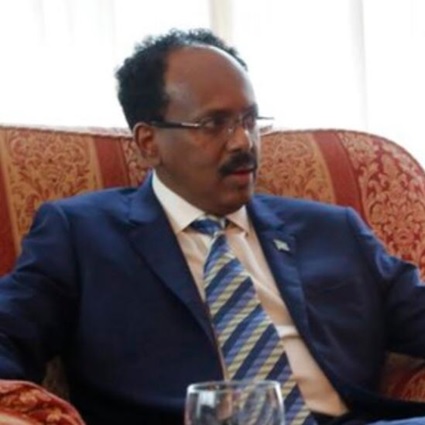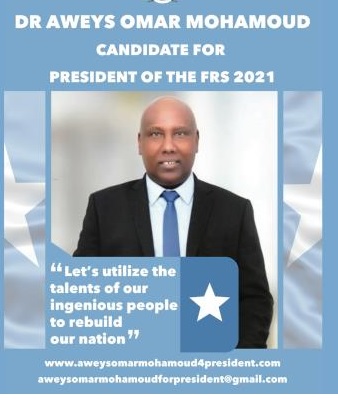Dr Aweys Omar Mohamoud
This is day 10 of an elected incumbent subverting democracy in Somalia, after his term ended. An incumbent takeover occurs when a democratically elected leader undermines key tenets of democracy, most often by abolishing or manipulating elections. According to various political science literature, military coups and incumbent takeovers together account for more than 90 percent of all authoritarian reversals.1 Reverting to some form of dictatorship, which is the way our country was governed under the late Siyad Barre, in a transitional democracy is quite common. The opposite of authoritarian reversals is democratic consolidation, the process by which a new democracy matures and gets to a point whereby it is unlikely to revert to authoritarianism without an external shock.

Somalia was on the way to becoming a full-fledged transitional democracy before the advent of Farmaajo. A transitional democracy like ours is always at risk of a democratic breakdown because of the fragility of our institutions and the dissatisfaction of our people owing to corruption, injustice and inequality, exclusion, discrimination and marginalization, youth unemployment, widespread poverty and lack of livelihoods, as well as massive humanitarian needs and millions of displaced people. The risk of an authoritarian reversal is about six times greater for transitional democracies than it is for consolidated democracies.2 Our post-conflict context, with such dire circumstances, must be double or triple that figure.
In addition to economic inequality and weak state capacity, our country’s past military dictatorship (which is what Mr. Farmaajo seems to be tapping into), and the nature of our transition from that dictatorship via a prolonged civil war are equally important determinants. A democracy that was governed by the military prior to its transition is about 50 percent more likely to revert to a dictatorship than a democracy that used to be a civilian dictatorship or a monarchy.
A renewed state of geopolitical power games in the region and authoritarian neighbours also have a substantial effect on the risk of democratic breakdowns in transitional democracies. A new democracy that is surrounded by dictatorships faces a serious risk of an authoritarian reversal that is about 60 percent greater than the risk faced by a new democracy that is surrounded only by democracies. Mr. Farmaaja’s recent close friendships with certain leaders in the region is highly relevant in this context.
That said, why does Mr. Farmaajo believe that he should retain power at any cost? Why should he commit himself to undermine the constitutional framework of the FGS? We all remember four years ago during the last election when Mr. Farmaajo presented himself as a democratic leader who spent most of his adult life in the United States. But in reality, he was a counterfeit democrat who saw the world in all-or-nothing terms. Unlike a genuine democrat, Mr. Farmaajo suffers from pathological tendencies contrary to the pragmatism necessary for compromise and mutual consent.
Therefore, and this is my theory, Mr. Farmaajo cannot accept the democratic premise that elections are the principal vehicle for determining who forms the next government and that, while they ought to provide all politicians with the opportunity to participate, the electoral contests themselves are designed to create unequal outcomes: for some to win, others have to lose. Those unequal outcomes matter for political legitimacy because they generate ambivalent attitudes towards political authorities on the part of the losers.
On many occasions, Mr. Farmaajo toyed in public with the idea of extending his rule beyond his term. His Addis Ababa interview back in February last year was peppered with loads of unmerited reasons as to why his regime out to continue beyond February 8, 2021. In front of the Djiboutian President in Mogadishu, Mr. Farmaajo openly praised President Ismaïl Omar Guelleh (in power since 1999) for building a major seaport in Djibouti which costed 1 billion US dollars and suggested that was only possible because of his longevity in power. He compared the position of the President of Djibouti with that of Somalia where there were 5 presidents and 9 prime ministers during the relevant period that President Guelleh was able to build those major public infrastructure projects. He said we shall learn a lesson from there and should apply that lesson here at home.
President Isaias Afwerki of Eritrea (in power since 1993) is another leader which President Farmaajo admires and is possibly trying to mimic. Well, there’s nothing wrong in admiring a President from a brotherly country nearby, but the circumstances of both Eritrea and Djibouti are very different to that of Somalia, which is a post-conflict democratic state (democracy being the antidote to dictatorship and civil war) trying to rebuild and reintegrate after more than four decades of as yet an ongoing armed conflict.
In his fascinating book, Disordered Minds,3 Ian Hughes provides a compelling and timely account of the dangers posed by psychologically dangerous individuals who come to positions of power, with catastrophic results for humanity. Hughes sets forth a model called the ‘toxic triangle’, comprising of destructive leaders, susceptible followers, and conducive environments, to illustrate how people with these disorders come to power. He then explains with insight and eloquence how leaders with disordered minds can take control in unstable societies (read post-conflict trauma case) and create mass movements that empower other disordered minds as well. The results can be disastrous: murder, mayhem, starvation, and war. The twentieth century cannot be understood without acknowledging the central role that people with these disorders played in fomenting the century’s most tragic events.
Mr. Farmaajo should seriously reflect (I know others have said this before and sadly it hasn’t changed his mind) the fact that both immediate predecessors of his, Presidents Sharif Sh. Ahmed and Hassan Sh. Mohamud, have willingly submitted themselves to the process that made them lose. They did not undermine the system to go ahead and play out, and they did not refuse to accept the outcome. Because they understood that the efficacy of our nascent democratic form of government could be seriously threatened if they as leaders undermined the process or, as losers, did not consent to their loss.
But if Mr. Farmaajo is not going to change his mind and insists on installing a new dictatorship in our country through his ‘militarization of political bargaining’,4 seriously, what shall we do? The main focus here must be what the international community can do and what we can and ought to do for ourselves.

I shall come to what we can do for ourselves in my next instalment, but I think Somalia’s international partners will now have to acknowledge that the impetus for spoiler behaviour comes from the leaders, and that a successful management of spoiler problems requires the recognition that leaders and parties in post-conflict situations like ours differ in their intentions, motivations, and commitment—dimensions that are crucial for understanding why some leaders undermine peace agreements. Mr. Farmaajo, the former FGS president, is the leader wilfully undermining the peace process in Somalia.
Thank you for reading and stay tuned for part III of ‘Wake Up Somalia! Your nascent democracy…’ to be published soon.
Dr Aweys Omar Mohamoud
For more info visit : Dr. Aweys’ Presidential Bid for 2021
———-
References
1. SVOLIK, MILAN W. (2014) Which Democracies Will Last? Coups, Incumbent Takeovers, and the Dynamic of Democratic Consolidation, British Journal of Political Science, doi:10.1017/S0007123413000550, Cambridge University Press, pp. 1-24, viewed 15 Feb. 2021, <untitled (illinois.edu)>.
2. ibid.,
3. Hughes, Ian (2018) Disordered Minds: How Dangerous Personalities are Destroying Democracy. Hampshire, UK: Zero Books 4. See ROESSLER, PHILIP, (2011) THE ENEMY WITHIN Personal Rule, Coups, and Civil War in Africa. World Politics 63, no. 2, 300–346 Copyright © 2011 Trustees of Princeton University doi: 10.1017/S0043887111000049, viewed 15 Feb. 2021, <Roessler.pdf>. Farmaaja’s hawkishness and militarism paints a man whose norms and ethics of militarism and intoxication with bombastic and militaristic pseudo-nationalism, the bitter fruits of which we have reaped before, might bring
We welcome the submission of all articles for possible publication on WardheerNews.com. WardheerNews will only consider articles sent exclusively. Please email your article today . Opinions expressed in this article are those of the author and do not necessarily reflect the views of WardheerNews.
WardheerNew’s tolerance platform is engaging with diversity of opinion, political ideology and self-expression. Tolerance is a necessary ingredient for creativity and civility.Tolerance fuels tenacity and audacity.
WardheerNews waxay tixgelin gaara siinaysaa maqaaladaha sida gaarka ah loogu soo diro ee aan lagu daabicin goobo kale. Maqaalkani wuxuu ka turjumayaa aragtida Qoraaga loomana fasiran karo tan WardheerNews.
Copyright © 2024 WardheerNews, All rights reserved


